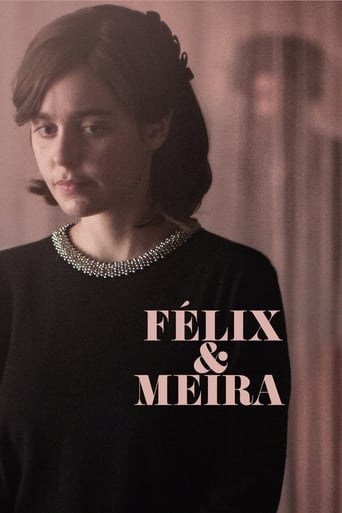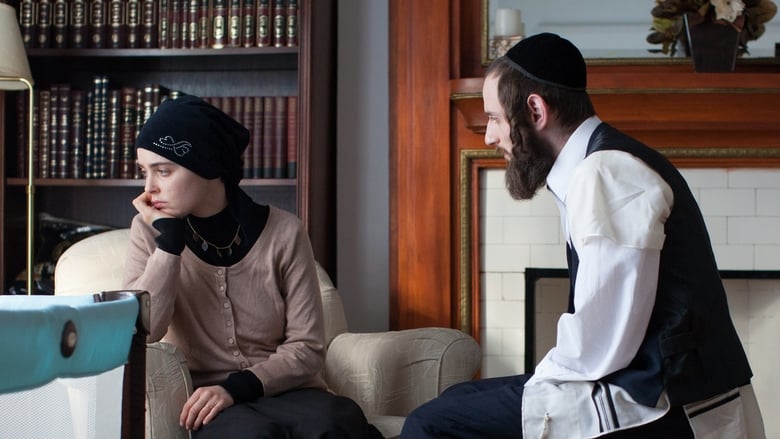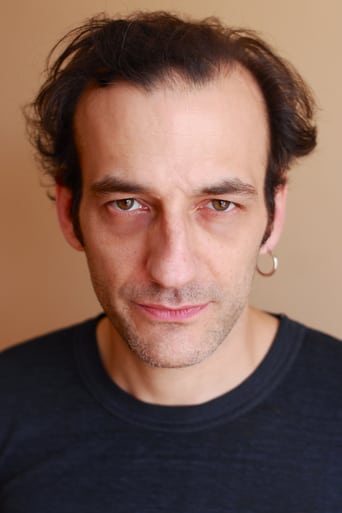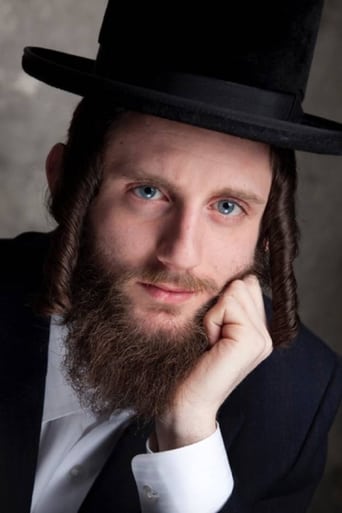Felix and Meira (2015)
A young married woman from Montreal's Orthodox Jewish community finds freedom from the strictures of her faith through her relationship with a young man who is mourning the death of his estranged father.
Watch Trailer
Cast
Reviews
Highly Overrated But Still Good
everything you have heard about this movie is true.
A waste of 90 minutes of my life
Very interesting film. Was caught on the premise when seeing the trailer but unsure as to what the outcome would be for the showing. As it turns out, it was a very good film.
It is always good to be able to define yourself. Even if traditions contradict your mind. In this film I saw the case when traditions are evil that rules over weak people. ....and love is not a tradition, it is a decision, not possible without knowing yourself. I like enormously the film, three main actors played excellent. What impressed me a lot were two sequences: the first one - the conversation between а "tradition man" Luzer Twersky and а "non tradition man" Martin Dubreuil; and the second one - when a "tradition man" broke his tradition listening to the song "After Laughter "after his wife left him.
Maxime Giroux's 'Felix and Meira' tone is set from the very first frame, captured in black and white. Malka or Meira plays with her soup with a soup spoon, a Shabbos meal. Her husband with finely curled ear locks, wearing a black hat trimmed in sable, and wearing a long black silk coat celebrates the Sabbath with gusto, in song and food and the pouring of wine. Meira feels estranged from this world of ultra Orthodox Jews, living in Montreal. A community that keeps very much to itself; insulated religiously in a world of Yiddish and Hebrew, prayers and rituals. A world in which husband and wife sleep in separate beds, according to tradition; coitus takes place only during days of ovulation; menstruation renders her impure, a ritual bath cleanses her. Malka wears a wig, long garments, She has but one duty to bear her husband many children. She doesn't; after the birth of her daughter she takes up pen and notebook to draw; she has a certain talent. She likes music which her husband forbids. She's listless and wanders aimlessly in her mind. In secret, she takes birth control tablets, for she doesn't want more children. And into her universe comes a secular man, an artist of sorts, a lost soul who feels empty because a strict father has never shown him love or interest since he didn't follow in the man's footsteps, it's inferred. So Felix travels and is now back in his own flat in Montreal, perhaps in Westmount, a Jewish enclave of Anglophone Jews. And as the narrative develops these two souls collide and a desperate, quite love arises between them. Too, late Meira's husband declares his love for her, but she is beyond his pleas for she has left an tradition from which she cut herself off and can never return. (Woody Allen treats the theme but without tragedy in 'Fading Gigolo', and Boaz Yakin treated seriously in the 1998 film 'A Price Above Rubies', with more or less the same outcome as Giroux's film.) The closing scenes are shot in Venice, on a grey day. A in an aside, Meira wishes regrets she has taken her daughter out of structured community, for life with her and Felix. Felix stolidly stares into the mournful cast of Venetian light. The pairing will never be happy, but, it is suggested, that in desperation they will cling to each other.
"Felix and Meira" (2014 release from Canada; 195 min.) brings the story of the two title characters. As the movie opens, we see Meira serving dinner to a group of Hasadic Jewish couples. Not a word is said during dinner, and you can immediately sense a sadness within Meira. It's only later that we understand she is bored and frustrated and suffocating under the tight-knit rules of the Hasadic Jewish community. Then we get to know Felix, a secular Jew whose father is dying. The two were not close but it still affects Felix significantly. One day, Felix runs into Meira and her 3 yr. old baby girl at the local coffee shop. He tries to strike up a conversation but she rejects him. Later on, though, it becomes clear that something is brewing between Felix and Meira. At this point we're at most 15-20 min. into the movie but to tell you more would spoil your viewing experience. You'll just have to see for yourself how it all plays out.Couple of comments: this is the third full-length feature from Canadian writer-director Maxime Giroux. This time he tackles a story line that plays out on the closed community that is the Hasadic Jewish Community. The 2012 "Fill The Voice" film explored similar themes as to the isolated Hasadic Jewish community, but here Giroux decides to make it even more personal by focusing on Meira and her conflicted feelings as to her overall life. In the beginning of the movie, Meira 'plays dead' to tease her husband. Much later on, when her husband asks why she doesn't do that anymore, Meira wistfully replies "Who says I'm not dead already?", wow. (And her husband's response to that? "When will you finally understand that this is our life? Pull yourself together!") It should be noted that, even though the closeness/isolationism of the Hasadic Jewish community can be an easy target for criticism, the movie treats them at all times with a great amount of respect. The acting performances are top-notch all the way, in fact I was wondering whether the Hasadic Jews were portrayed by actors or by real Hasadic Jews. Hadas Yaron as Meira is outstanding (she also played the role of a Hasadic Jewish wife in "Fill the Void" by the way.) Compared to that, Martin Dubreuil as Felix has a harder time staying in the lime light. Last but not least, there is an outstanding clarinet-heavy musical score (composed to Olivier Alary), and even fellow Canadian Leonard Cohen contributes a tune ("Famous Blue Raincoat"). Bottom line: this is a slow-moving (in the best possible way) family drama set within the Hasadic Jewish community that caught my attention from start to finish."Felix and Meira" opened without any pre-release fanfare or advertising at my local art-house theater here in Cincinnati this Memorial Day weekend. The matinée screening where I saw this at was very nicely attended, somewhat to my surprise to be honest (the audience was heavy on the seniors, I might add). If you are in the mood for a top-notch quality foreign movie that is GALAXIES away from the latest Mad Max or Pitch Perfect, do yourself a favor and check this out, be it in the theater, or eventually on VDV/Blu-ray. "Felix and Meira" is HIGHLY RECOMMENDED!
I was completely blown away by this unique film. It is a gentle, nuanced look at two people from very different communities who connect and fall in love. The young woman is from the Hassidic community in Montreal. She is questioning her life and the limitations imposed on her by her community. The man she meets is not from her community and at a crossroads in his life. While this premise might seem implausible, it is explored with subtlety and respect. I cannot forget to praise the terrific performances of the three main actors. Israeli actress Hadas Yaron is simply amazing as Meria, the young Hassidic woman who is stifling in her marriage and community. Martin Dubreuil is also very good as Felix who is in search of something but is not quite sure what. All he knows is that he is instantly attracted to the shy, reluctant young woman and he must try to connect with her in any way he can. The chemistry between the two is simply electric. The character of Meira's husband could have easily been portrayed as the clichéd overbearing, uncaring spouse. Instead, actor Luzer Twersky makes him a sympathetic character trapped by his own failings. He simply does not know how to deal with his wife's angst. There are some incredible moments of tenderness in this film (The first time Felix and Meira hold hands is understated but very powerful). Overall this is a beautiful layered love story that is full of hope and happiness. Love will always find a way. Not to be missed. Bravo Maxime Giroux for giving us such a beautiful film.





